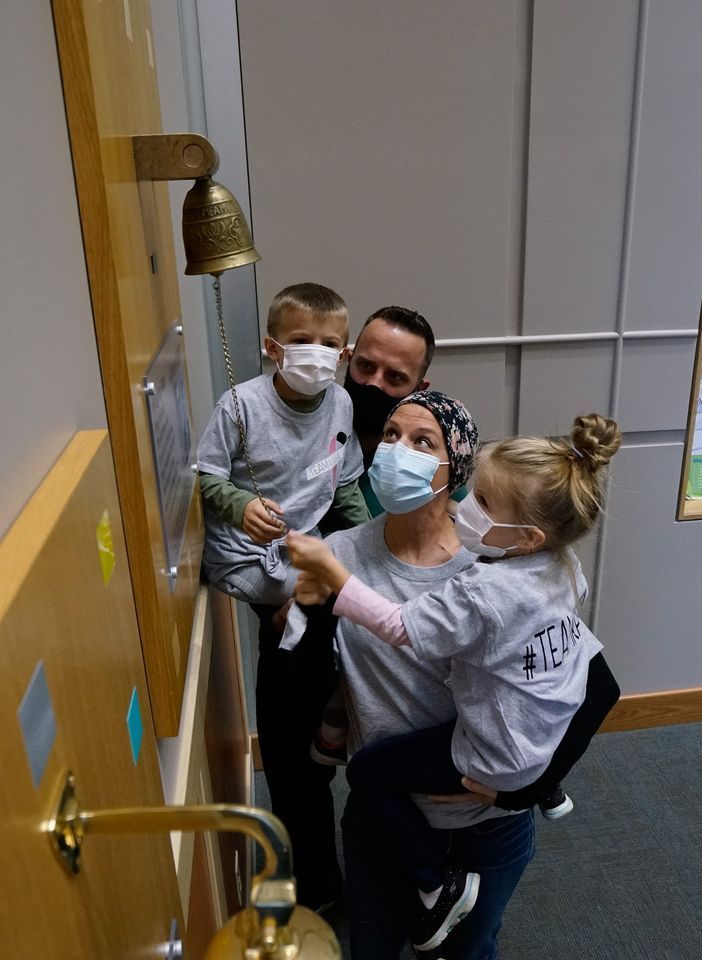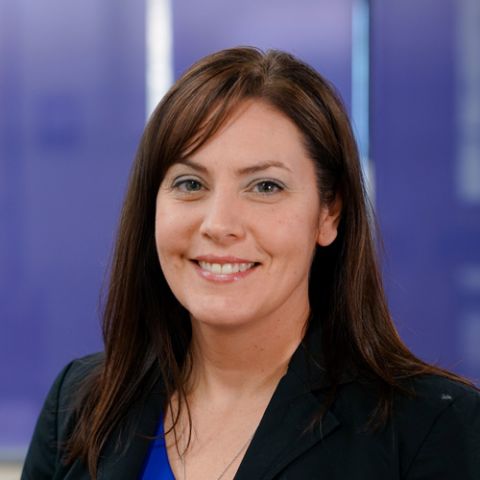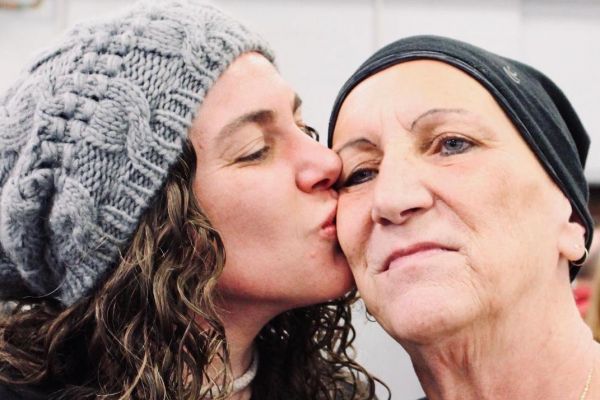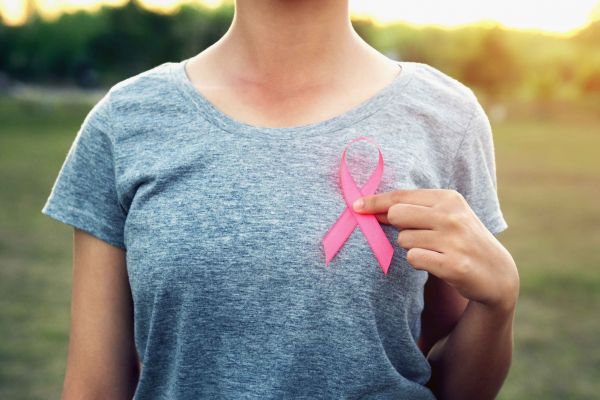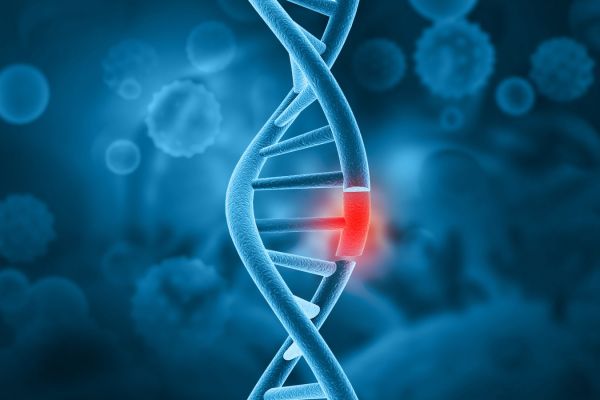If you’ve seen the Roswell Park Alliance Foundation’s holiday commercial, you may already know a little bit about Kara Rowe. Kara, 36, is a mother of two. Like everyone else, this year she’s trying her best to deal with the stress of a tumultuous world, but she’s strong and tough. You have to be when you’re raising kids in the middle of a pandemic.
Kara says being tough is her only choice. She has learned that by watching the strong women around her: Her mother, grandmother and aunt have all been diagnosed with breast cancer.
Alarm bells went off for Kara when she realized that those close relatives all had the same disease. Fearing she might be next, she decided to undergo genetic testing to see if she had the “breast cancer gene.” She did — the test came back positive for BRCA2.
Living with that knowledge would be tough for anyone. “It was always in the back of my mind,” Kara says. She received her positive test at age 23 and did her best to keep her life on an even keel.
The first challenge
It wasn’t until she was breastfeeding her second child that she felt something unusual. While nursing mothers may occasionally feel sore or find a hard spot in a breast, that’s usually due to a blocked milk duct. But with her family’s history in mind, Kara knew she had to get it checked. Yearly mammograms aren’t recommended until a woman is at least 40 years old, but she couldn’t afford to wait.
At 30 years old, Kara had a mammogram and learned that she had breast cancer. “I wasn’t shocked at all by the diagnosis,” she says.
Having breast cancer and a BRCA mutation adds up to a much higher risk of recurrence. In 2015 Kara decided to have a double mastectomy in addition to chemotherapy. The goal: not just to remove the cancer but also prevent it from coming back.
Because her genetic profile also put her at high risk for ovarian cancer, she had to face another difficult decision — whether to have her ovaries removed. “This decision was really hard for me,” Kara admits. “I wanted to have more children. But I was going to do whatever was going to save my life; there was no question about that.” She went forward with the operation and ultimately completed her chemotherapy treatments for breast cancer.
Concerns at follow-up
“Once treatment is completed, it’s important for patients to attend their follow-up appointments to assess for recurrence or complications from their therapies,” stresses Denise Rokitka, MD, MPH, Director, Young Adult and Oncofertility Program. “For young adult patients, that can be tough to do as you get back into the routine of work, family or social engagements and that overall feeling of ‘normal’ again.”
Kara was vigilant and regularly followed up with her primary oncologist at Roswell Park. At one appointment, a physician assistant noticed something abnormal on her skin.
“I was asked about a birthmark on my stomach,” Kara recalls. “I was told it looked stretched out. I’ve had kids; of course it stretched out. Why should that matter?”
To be safe, a biopsy was performed on the growth. When the results came back, Kara found out she had melanoma.
“I was very fortunate with the melanoma. I was told the spot was less than a millimeter away from needing more chemotherapy.” Instead of going through another tough chemo regimen and dealing with the side effects, she had the melanoma removed in an outpatient surgery that only took a few hours.
‘I couldn’t believe it’
Then, in November 2019, Kara developed a cough that wouldn’t go away. At first, as many parents do, she attributed that to her son being sick, but she made sure to bring it up at her next appointment.
“Young adults can think that they’re invincible. If something changes, they tend to dismiss it and keep quiet,” says Dr. Rokitka. “This can be an issue, especially when it comes to cancer, because the tumor can grow, or the condition can worsen and present at a later stage, making it harder to treat and reducing the survival rate significantly.”
“Kara had already battled cancer twice, and thankfully, she knew not to keep quiet about changes to her health.”
“I had a cough for about seven weeks,” Kara says. “That’s not normal, but I couldn’t believe it the next day when they got the results of my CT scan and told me it was stage 4 lung cancer.
“I’m not a smoker and I don’t live with a smoker. We even had the house tested for radon. I never thought I was a candidate for lung cancer. It just felt like the rug was pulled out from under me.”
The bad news continued: the cancer had spread.
“I also began having headaches. I just thought it was from using the computer or stress, so I brought that up at one of my appointments. They gave me an MRI and found lesions on my brain.”
‘I just kept thinking of my kids’
Nobody would fault Kara if she couldn’t keep it together under the weight of three consecutive cancer diagnoses before the age of 40. Instead of giving up, she found hope in those closest to her.
“I just kept thinking of my kids. I’d do anything and everything to get better,” she says. “I prayed a lot, I changed my diet, I did everything I could think of, but to be told at 36 that you might not make it five years is tough.”
The third diagnosis led to a multidisciplinary approach combining surgery, chemotherapy and Gamma Knife radiosurgery, which brought with it some nausea, an unfortunate side effect of treatment.
“The third time was the most difficult,” says Kara. “The radiation mask for the Gamma Knife didn’t bother me, but I had an unusual reaction to the treatment and that left me very ill, but the chemo I was able to handle well.”
On the bright side — if there is one to be found in all of this —the chemotherapy began to kill the lung tumor and the surgery went well. The cancer was removed.
The importance of mental health support
With each new cancer diagnosis, it would have been easy to lose hope in the future. Young adults who get cancer often have a long, unpleasant road ahead of them.
“It’s tough for young adults who go through chemotherapy or radiation, as they often have some long-term side effects,” explains Dr. Rokitka. “Cancer treatments can weaken your immune system and may even put you at higher risk for other types of cancer. While this can take a huge physical toll on your body, it’s important to focus on your mental state as well. Often people who need help are afraid to ask for it.”
Roswell Park has mental and emotional support programs in place for cancer patients. Some are designed specifically for patients like Kara, who are trying to raise a family while facing an uncertain future.
“At Roswell Park, thanks to donor funds, we have a psychologist just for young adult patients,” says Dr. Rokitka. “We often see spikes in anxiety or depression once treatment finishes, so we have a team that’s there to support you.
“Your body and mind are packaged as a team. You have to take care of both of them.”
That support extended beyond Kara to include her young children. Roswell Park’s Child Life Program helped them by explaining their mom’s treatment and what she was going through. Through therapeutic play, they were able to create jewelry and teddy bears while talking about what they were feeling. To help relieve some of their fears, a concept called “medical play” introduced the children to the different devices they would see being used in their mother’s treatment.
‘Do whatever it takes’
“It’s cliché, but since treatment ended, I have been taking things one day at a time,” says Kara. “For so long, I was working long, crazy hours and not spending enough time with my kids. But all this has helped me slow down and appreciate everything I have.”
“For younger adults facing cancer, even when it’s over, it’s never really ‘over,’” says Dr. Rokitka. “Some people decide to live life to its fullest and travel all over and do crazy bucket-list things, while others feel this overwhelming anxiety and live with fear. Kara has a good head on her shoulders. I am confident she’ll handle whatever comes next with a strong, positive attitude.”
“Positivity is everything,” Kara says proudly. “I am not someone who likes calling in sick or staying in bed. I don’t like feeling weak, and Roswell doesn’t make me feel like that.”
During Kara’s time at Roswell Park, experts in nearly every specialty have cared for her, and she has undergone nearly every form of treatment imaginable. How is it possible for a working mother of two, a three-time cancer survivor at 36 years old, to keep moving forward?
“You have to keep fighting and do whatever it takes,” says Kara “I owe my life to Roswell, and I give my doctors all the credit. For some reason, cancer likes my body, but I have to get through this. I don’t have any other choice.
“I’ll do anything to be there for my children.”
Roswell Park's Holiday Fund Drive
Consider giving today to help power the breakthrough research, treatments and care that are saving lives from cancer.
Donate TodayEditor’s Note: Cancer patient outcomes and experiences may vary, even for those with the same type of cancer. An individual patient’s story should not be used as a prediction of how another patient will respond to treatment. Roswell Park is transparent about the survival rates of our patients as compared to national standards, and provides this information, when available, within the cancer type sections of this website.
